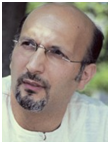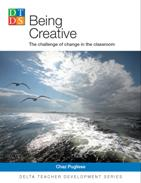
Chaz Pugliese, MA and Ph.D candidate, is a self-employed trainer, lecturer, presenter and author working out of Paris, France. Previously Director of Teacher Training at Pilgrims, UK, he continues to collaborate with Pilgrims as well as other top Teacher Training institutes in the UK. Chaz has trained hundreds of teachers all over the world, has been a keynote speaker at conferences in as many as 30 countries and has contributed over 60 articles and papers to all major ELT publications. Currently, he holds a column in English Teaching Professional. His first book, Being Creative: the Challenge of Change in the Classroom was published by Delta in 2010. His second book, with Zoltan Dornyei and Jane Arnold, will be out with Helbling in 2014. His research interests are: Motivation and Creativity, Materials Development and Group Processes.
Here is the video interview with Chaz at the IATEFL conference, Harrogate, 2014.
http://iatefl.britishcouncil.org/2014/sessions/2014-04-04/interview-chaz-pugliese

On 15-17 April 2014, the Lithuanian Association of teachers of English as a Foreign Language LAKMA and Vilnius Simonas Daukantas Progymnasium hosted a series of workshops by Chaz Pugliese for English language teachers of Lithuania. The workshops were enjoyed by over 80 participants representing different levels of education. The topics included Creativity and Motivation, Principled Communicative Teaching and Multiple Intelligences Theory.
Chaz kindly agreed to answer a few questions of the workshop participants.
What could we do to motivate our students to learn?
The first thing to remember is that there’s no quick fix, no Harry Potter-ish potion, no algorithm for helping people motivate themselves. I also think that often the way we communciate with our kids can make a big difference. I’ll give you an example of what I consider effective communication which may result in self-determination, and one that may lead to demotivation.
If a teacher (or a parent, for that matter) says: Well done. But you’re still behind (compared to the rest of the class), this may look harmless prima facie, but it isn’t, really. What the teacher is doing is encouraging social comparisons, and what the kid understands is ‘I need to do better or I won’t be like the others in the group’. So, the motivation, if any, coming from all that, is not so much to learn, but to conform and be like the others. Again, it’s external motivation, not conducive to self-determination which is what we’re interested in developing.
Now consider this other example: Well done: you must’ve worked hard to achieve this, and your English is better than it was last month. Now, this is much better, and for a couple of reasons. A) The teacher is praising the student for the effort made, rather than for the end result, so the student understands that hard work is rewarded. B) The comparison is with his/her own work, rather than his/her peers, and in so doing the teacher is encouraging the student to activate a more positive vision of him/herself.
What do you think of the view that the best way to motivate children to learn is to use ICT?
ICT, or not. I think we have a propensity for dichotomies in our profession… At the end of the day, I really don’t think it’s this or that tool, but rather, what the teacher does with it. And I believe that if ICT is not used with suffcient imagination and pedagogical wisdom may lead to demotivation, even if kids are well versed with modern technology. Kids are not a bunch of idiots and they can tell when a teacher has spent time to think things through or when s/he’s using ICT because the kids think it’s cool. I’ve had students begging me not to use slides, or the internet, for example. It’s not this or that tool; but it’s how a teacher juggles everything to provide the students with plenty of variety. So, using ICT because it’s fashionable, because the kids are familiar with tablets etc, all this is not bound to trigger motivation if it’s not supported by solid pedagogical ideas, and, again, variety.
What do you like about teaching?
I like thinking up of pedagogic ways, ideas, practices, that would facilitate my students’ encounter with the content. I think this type of emotional reward is what gives me a real high. In addition, I like learning from my students: this may sound a little trite but it really is true. Students never cease to amaze me, they have such imagination, and they can be so fresh! Not long ago, one of my students told me, a little tongue in cheek, that the past for the verb beHAVEe shoud be beHAD and not behaved… Interesting point! Finally: perhaps unlike most of my colleagues, I really enjoy teaching large classes, more than 35, for example. In China I worked with a group of 125 secondary teachers! Yes it was chaotic (but isn’t all type of teaching organized chaos?) but I just loved feeding off their energy.
What can you call the teacher’s best friend – inspiration, good education or creativity?
I think all three are fundamental for different reasons. I would add good people’s skills, an interest in fellow humans, and the ability to improvise. This should not be understood as ‘anything goes’, but rather working between the structure provided by the lesson plan and the freedom provided by the ‘here and now’. It’s this tension that often makes lessons interesting. After all, don’t we all improvise in life?
What would you do if you were not a teacher/teacher trainer?
Easy: I’d most definitely be a musician. In fact I still find it hard to decide whether I’m a teacher with a passion for guitars and music or a musician with a passion for teaching!
How did you decide to write your first book “Being Creative”?
Well, I’ve been interested in Creativity issues for quite some time. What interests me is the link between the teacher’s creativity and the students’ motivation. About five years into the profession I realized that the best classes were not dependent on a coursebook or some other people’s materials, but the ones based on the materials I was designing for my own students. Because for me Creative teaching is not a luxurious extra but an absolute must, I found myself pretty set on this path of manufacturing ideas to use in class with my students. So, as soon as I hit a certain number of activities, I thought that it would be nice to share them with colleagues, I approached a publisher and that was that. There’s one other reason: I’m a very messy writer, I write everywhere I can and I write whenever I can, I must‘ve lost dozens of ideas over the years… so having all my exercises neatly arranged in a book comes in very handy!
What is your second book about? What is the title?
My second book is (tentatively) called Seven Principles for Comm.ve Language Teaching. I wrote it with professors Z. Dornyei and J. Arnold. It’s some kind of CLT for the 21st century. What we’re trying to do is highlight the principles that provide theoretical support for CLT, vailidated in both psycholinguistics and psychology, and then present a series of practical exercises to show how these principles can be implemented in the classroom. The book will be out with Helblings in September. I have two other titles in preparation, by the way: one on Spoken Grammar and one on Motivation (with Maggie Kubyanova). So, you may say I’m keeping busy!
What is your impression of the English language teachers in Lithuania? How do we compare to other groups of your trainees?
This is a very difficult question for me to answer because I was only there three days and, apart from just a few, I saw new people every day. However, this much I know the public were very receptive and very curious and I really enjoyed working there!
